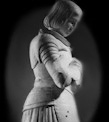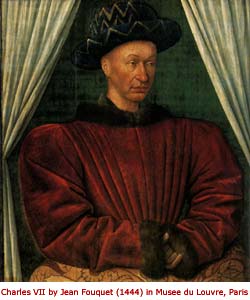|
|
||
|
|||
|
|||
|
|
|
||
|
Joan of Arc never claimed to have a coat of arms, but rather, arms were given to her brothers by Charles VII without her request and without revelation. At one point, she described these arms to a painter when he asked what arms she bore. Upon the coronation of Charles VII, Joan did, however, make two requests: permission to return home to her mother, and the remittal of taxes on her village. On December 29, 1429, in praise of her great deeds, King Charles VII officially remitted the taxes on the people of Domrémy and enobled the d'Arc lineage in perpetuity by granting them the surname "du Lys". The Great Deeds of Joan of Arc According to Mark Twain, there were five great deeds accomplished by Joan of Arc. First, the raising of the siege at Orléans, her first victory against all odds. Second, the victory of Patay. Third, the reconciliation at Sully-sur-Loire in which Joan re-empowered Constable Richemont. This was perhaps the most important: Richemont led his army after Joan's execution to reclaim Paris in 1433, and in doing so, further enobled King Charles VII to drive away the English; even from regions where the people had been under their mastership for three hundred years. Fourth, the "Bloodless March" is the most extraordinary military campaign in history. After the lifting of the siege at Orléans, Joan led Charles the Dauphin on a long march from Gien to Reims through English occupied territory, capturing every English town and fortress that barred the road, from the beginning of the journey to the end of it; and this by the mere force of her name, and without shedding a drop of blood. Lastly, the coronation of King Charles VII in Reims Cathedral on July 17, 1429, was a masterpiece of diplomacy, an advantage of incalculable importance. Customary anointment with the holy oil linked Charles VII to the kings of Israel and to David, and consecrated him as the King of the Francs, thereby preempting the ad hoc coronation of Henry VI at Nôtre Dame Cathedral in Paris on December 16, 1430. Joan's Request of King Charles "Now, O gentle King, is the pleasure of God accomplished according to His command that you should come to Rheims and receive the crown that belongeth of right to you, and unto none other. My work which was given me to do is finished; give me your peace, and let me go back to my mother, who is poor and old, and has need of me." The King raised her up, and there before all that host he praised her great deeds in most noble terms; and there he confirmed her nobility and titles, making her the equal of a count in rank, and also appointed a household and officers for her according to her dignity; and then he said: "You have saved the crown. Speak--require--demand; and whatsoever grace you ask it shall be granted, though it make the kingdom poor to meet it." Now that was fine, that was royal. Joan was on her knees again straightway, and said: "Then, O gentle King, if out of your compassion you will speak the word, I pray you give commandment that my village, poor and hard pressed by reason of war, may have its taxes remitted."
"That is all." "All? Nothing but that?" "It is all. I have no other desire." "But that is nothing--less than nothing. Ask--do not be afraid." "Indeed, I cannot, gentle King. Do not press me. I will not have aught else, but only this alone." The King seemed nonplussed, and stood still a moment, as if trying to comprehend and realize the full stature of this strange unselfishness. Then he raised his head and said: "She has won a kingdom and crowned its King; and all she asks and all she will take is this poor grace--and even this is for others, not for herself. And it is well; her act being proportioned to the dignity of one who carries in her head and heart riches which outvalue any that any King could add, though he gave his all. She shall have her way. Now, therefore, it is decreed that from this day forth Domremy, natal village of Joan of Arc, Deliverer of France, called the Maid of Orleans, is freed from all taxation forever."[1] [1] IT was faithfully kept during three hundred and sixty years and more; then the over-confident octogenarian's prophecy failed. During the tumult of the French Revolution the promise was forgotten and the grace withdrawn. It has remained in disuse ever since. Joan never asked to be remembered, but France has remembered her with an inextinguishable love and reverence; Joan never asked for a statue, but France has lavished them upon her; Joan never asked for a church for Domremy, but France is building one; Joan never asked for saintship, but even that is impending. Everything which Joan of Arc did not ask for has been given her, and with a noble profusion; but the one humble little thing which she did ask for and get has been taken away from her. There is something infinitely pathetic about this. France owes Domremy a hundred years of taxes, and could hardly find a citizen within her borders who would vote against the payment of the debt. from Personal Recollections of Joan of Arc by The Sieur Louis de
Conte (Her Page and Secretary) |
|||
go on to Her Signature >>|Home| |Back to Top| |Contact Us| |Copyright ©| |Privacy Policy| |Site Map|
|
|||



 "It is so commanded. Say on."
"It is so commanded. Say on."